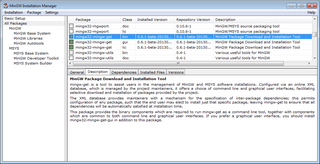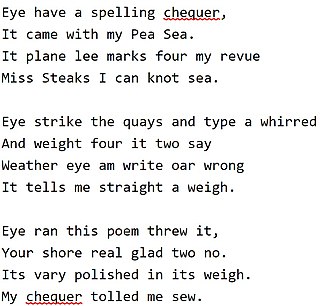| Final release | 0.12.2 / 2001-05-30 |
|---|---|
| Written in | C |
| Type | Spell checker |
| License | GNU Lesser General Public License |
| Website | http://sourceforge.net/projects/pspell |
Pspell (Portable Spell Checker Interface Library) is a program meant to provide a generic interface to the system spelling checking libraries. It was, and sometimes still is, used in computer programming such as C, and is licensed under the GNU Lesser General Public License.
Pspell has not been updated since 2001, but is still available on SourceForge at its project page. It has been replaced by GNU Aspell. PHP’s Pspell extension, while retaining its current name, now uses the Aspell library.

gnuplot is a command-line and GUI program that can generate two- and three-dimensional plots of functions, data, and data fits. The program runs on all major computers and operating systems . Originally released in 1986, its listed authors are Thomas Williams, Colin Kelley, Russell Lang, Dave Kotz, John Campbell, Gershon Elber, Alexander Woo "and many others." Despite its name, this software is not part of the GNU Project.

MinGW, formerly mingw32, is a free and open source software development environment to create Microsoft Windows applications.

Scanner Access Now Easy (SANE) is an open-source application programming interface (API) that provides standardized access to any raster image scanner hardware. The SANE API is public domain. It is commonly used on Linux.

In software, a spell checker is a software feature that checks for misspellings in a text. Spell-checking features are often embedded in software or services, such as a word processor, email client, electronic dictionary, or search engine.
GNU Parted is a free partition editor, used for creating and deleting partitions. This is useful for creating space for new operating systems, reorganising hard disk usage, copying data between hard disks, and disk imaging. It was written by Andrew Clausen and Lennert Buytenhek.
GNU Aspell, usually called just Aspell, is a free software spell checker designed to replace Ispell. It is the standard spell checker for the GNU operating system. It also compiles for other Unix-like operating systems and Windows. The main program is licensed under the GNU Lesser General Public License, the documentation under the GNU Free Documentation License. Dictionaries for it are available for about 70 languages. The primary maintainer is Kevin Atkinson.

NEdit, the Nirvana editor, is a text editor and source code editor for the X Window System. It has an interface similar to text editors on Microsoft Windows and Macintosh, rather than to older UNIX editors like Emacs. It was initially developed by Mark Edel for Fermilab and released under a very restrictive licence, but today it is distributed under the less restrictive GPL-2.0-or-later and is developed as an independent open-source project by a team of developers. Nedit was also distributed with the IRIX operating system.

Ispell is a spelling checker for Unix that supports most Western languages. It offers several interfaces, including a programmatic interface for use by editors such as Emacs. Unlike GNU Aspell, ispell will only suggest corrections that are based on a Damerau–Levenshtein distance of 1; it will not attempt to guess more distant corrections based on English pronunciation rules.
MySpell is a free spell checker, written to explore how affix compression could be implemented.

GNU Ubiquitous Intelligent Language for Extensions is the preferred extension language system for the GNU Project and features an implementation of the programming language Scheme. Its first version was released in 1993. In addition to large parts of Scheme standards, Guile Scheme includes modularized extensions for many different programming tasks.
The following tables compare general and technical features of notable email client programs.
This article provides basic comparisons for notable text editors. More feature details for text editors are available from the Category of text editor features and from the individual products' articles. This article may not be up-to-date or necessarily all-inclusive.

Mercurial is a distributed revision control tool for software developers. It is supported on Microsoft Windows, Linux, and other Unix-like systems, such as FreeBSD and macOS.
The Free Software Directory (FSD) is a project of the Free Software Foundation (FSF). It catalogs free software that runs under free operating systems—particularly GNU and Linux. The cataloged projects are often able to run in several other operating systems. The project was formerly co-run by UNESCO.
Hunspell is a spell checker and morphological analyser designed for languages with rich morphology and complex word compounding and character encoding, originally designed for the Hungarian language.
XBLite is a free open-source BASIC programming language compiler and development system. It was started in 2001 by David Szafranski in order to provide a Windows exclusive version of the XBasic dialect. XBLite is released under the GNU GPL licensing scheme, Standard libraries are released under the GNU LGPL licensing scheme.

WeeChat is a free and open-source Internet Relay Chat client that is designed to be light and fast. It is released under the terms of the GNU GPL-3.0-or-later and has been developed since 2003.
Virastyar is a Persian add-in for Microsoft Word that performs Persian spell checking, character standardization, Pinglish transliteration, punctuation correction and calendar conversion. It can conjugate approximately 46,000 simple verb tense, and use inflection and morphological rules to recognize possible extensions of a word. It covers approximately 2,800 non-verbal inflections for nouns, adjectives, adverbs, prepositions, numerals, classifiers, and pronouns.
spell is the standard English language spell checker for Unix, Plan 9, and Unix-like operating systems.

Uruk GNU/Linux-libre is a PureOS-based Linux distribution. The name Uruk is an Iraqi city that states its Iraqi origin. Uruk GNU/Linux 1.0 was released on 13 April 2016 and it ships with the most common software for popular tasks.